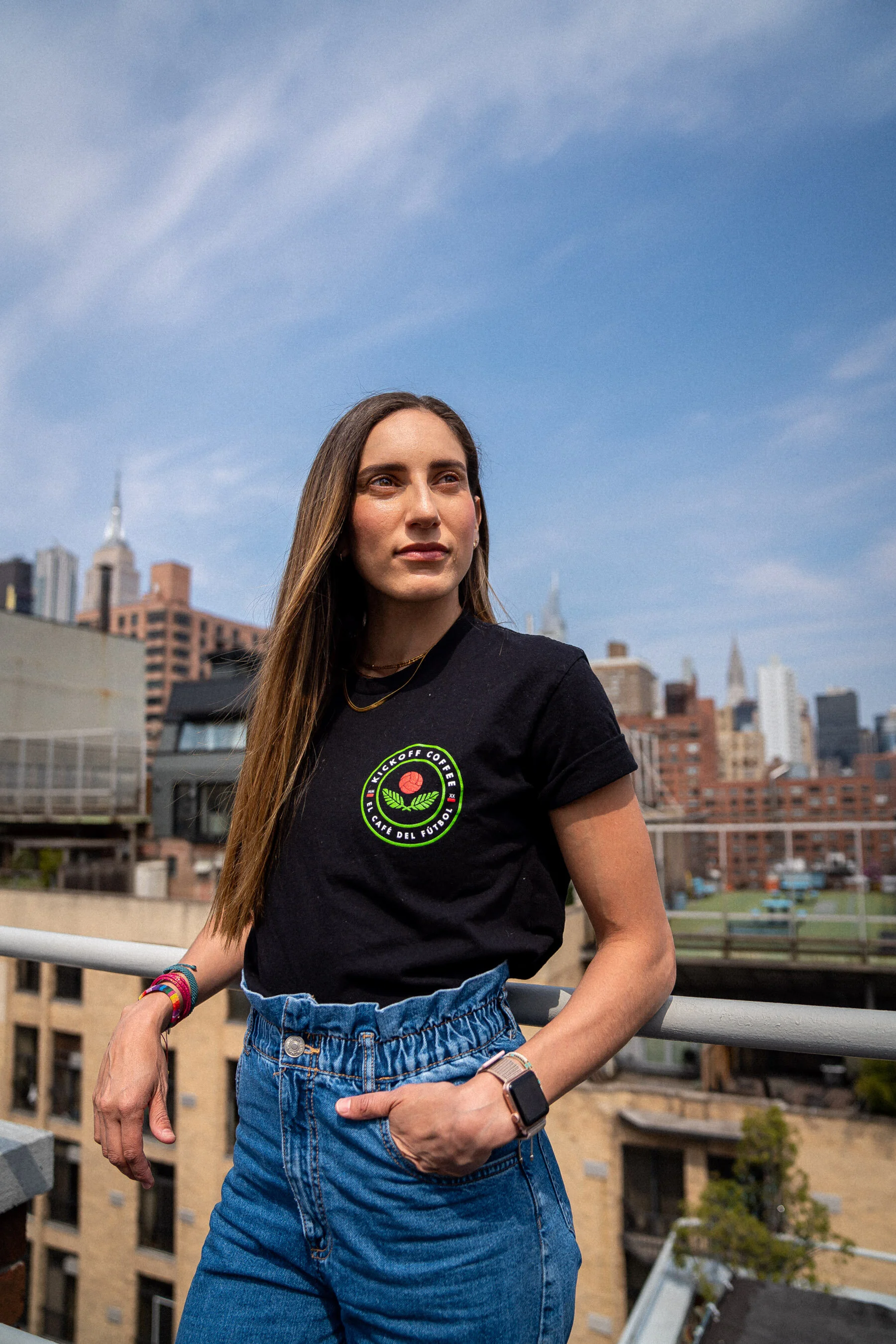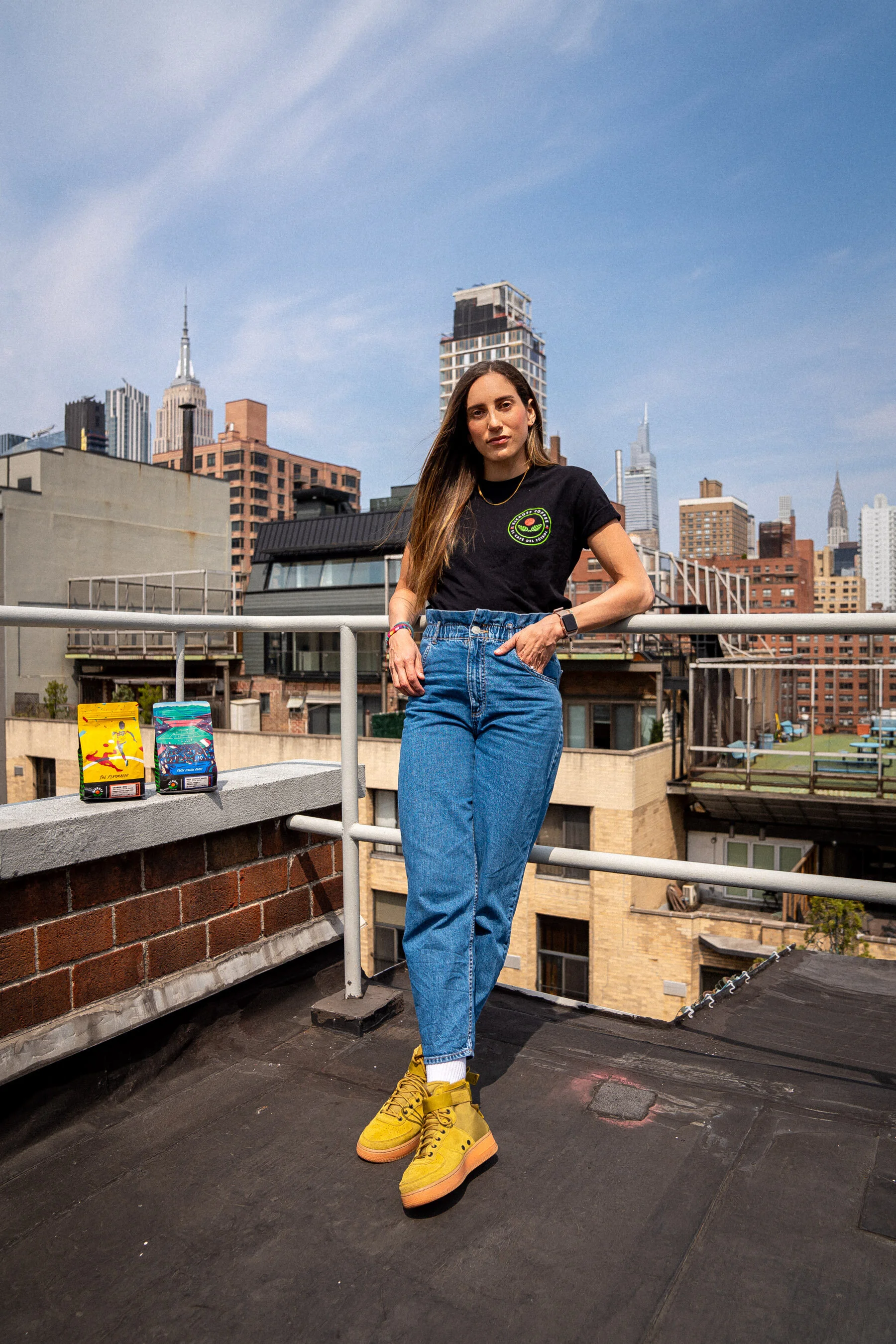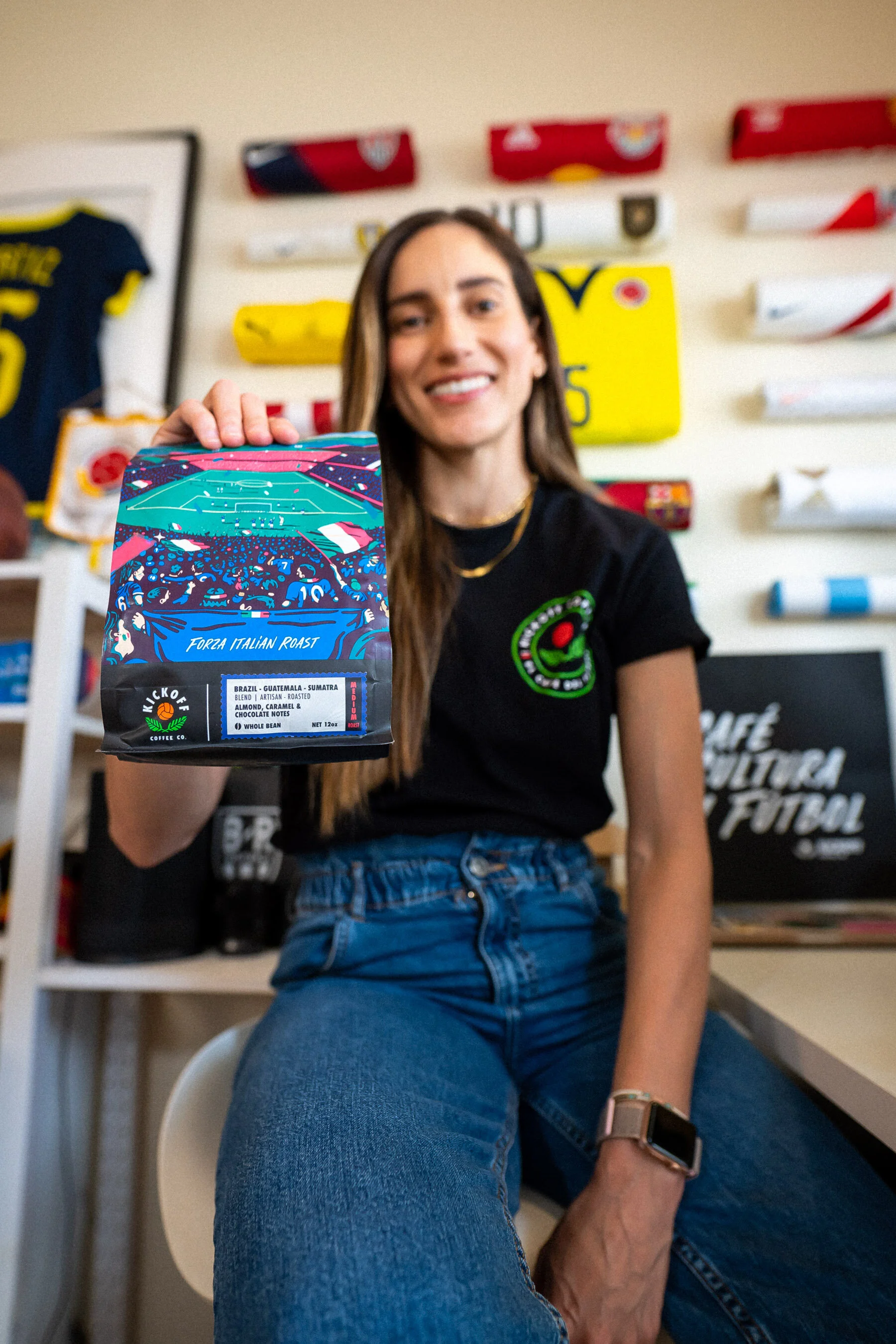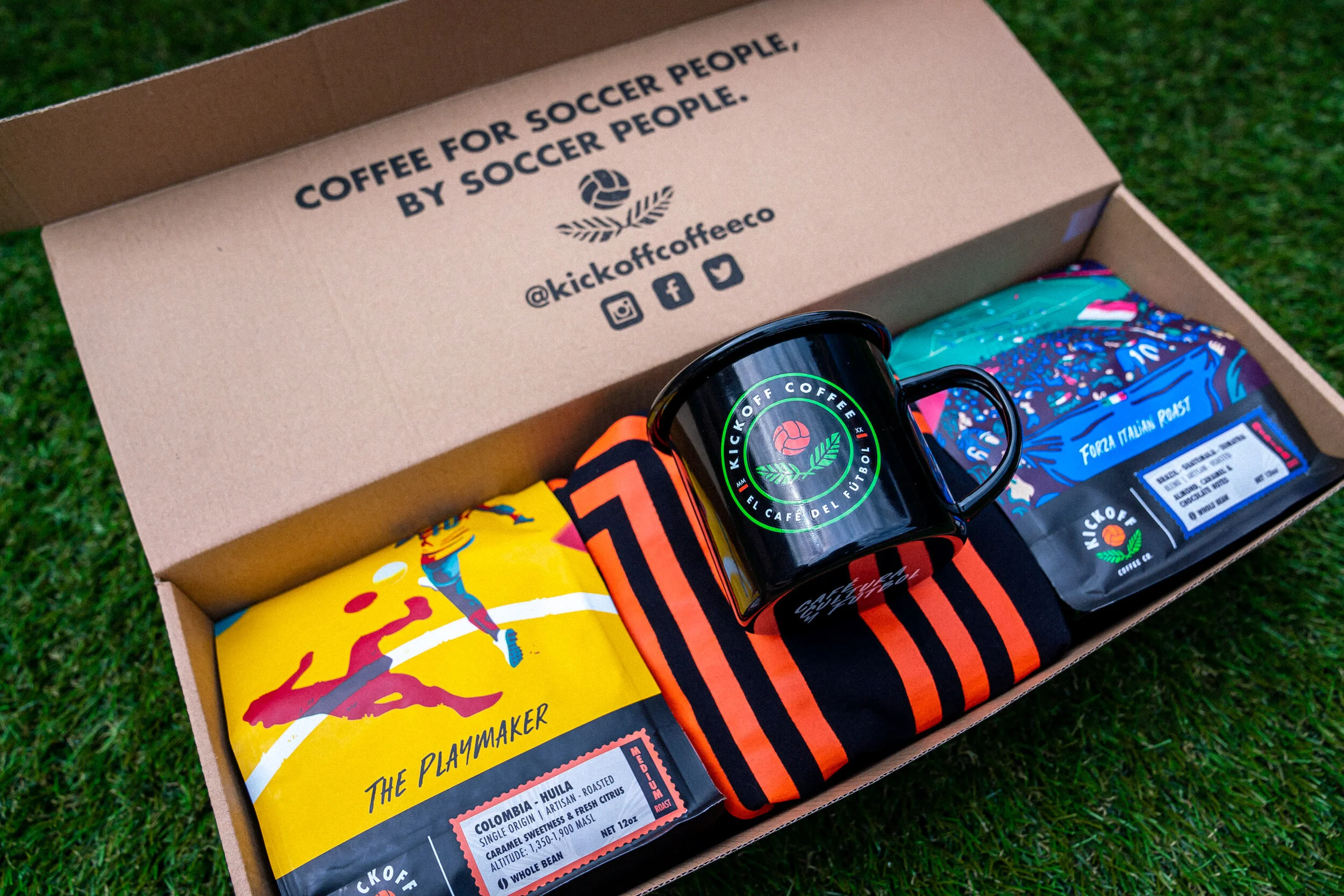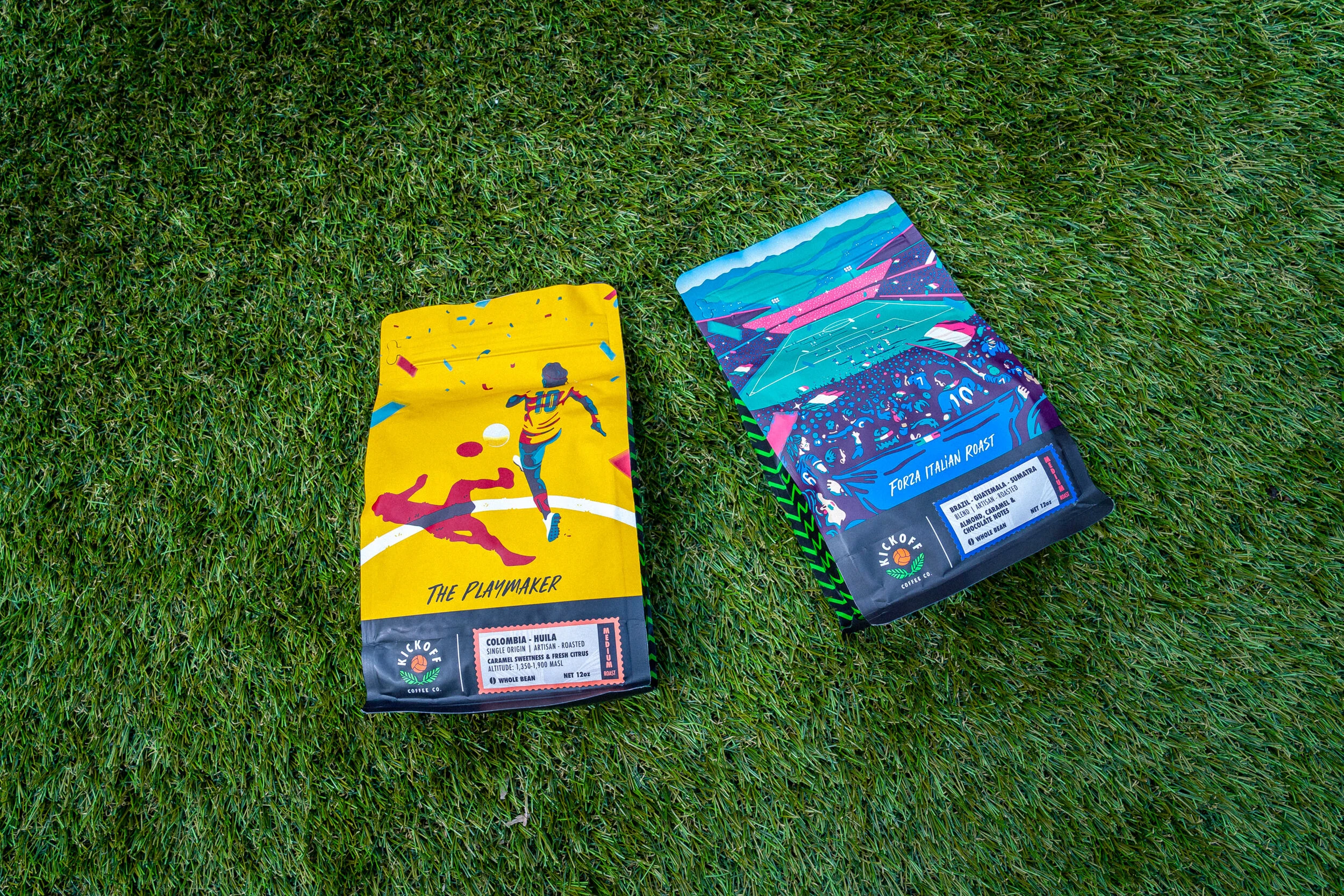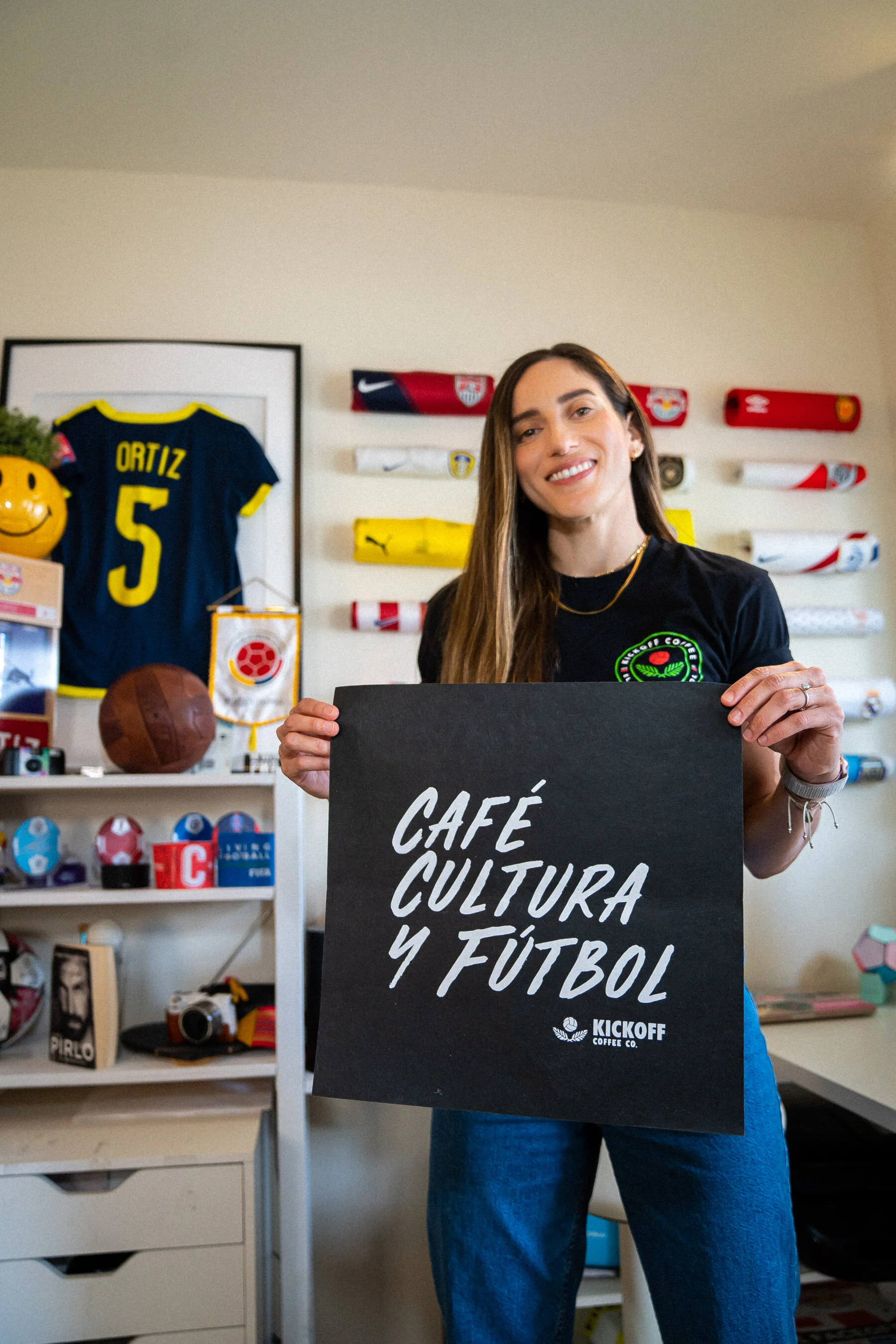The Perfect Blend

“I went to the ground, felt my right foot, and I knew right then and there that I wouldn’t be going to the World Cup.”
Six days before the 2015 Women’s World Cup in Canada, Colombia National Team star Melissa Ortiz tore her right Achilles tendon. It was nearly the end of an illustrious international career that had taken her to a U-20 World Cup and the Olympics. At the same time, it was the beginning of a dream career off the field that kept her tied to the game and made her one of the most prominent female soccer content creators in North America.
Melissa grew up in Florida with a ball at her feet. With two older brothers and being the only girl in the family, soccer was a way to connect with her siblings. From the age of four, Melissa already knew soccer was what she loved to do.
“My mom would give me Barbie dolls and put me in like Flamenco classes, and I was not having it,” said Melissa with a laugh. “I just wanted to play soccer. That was the thing that I fell in love with since I was really young.”
Playing alongside her brothers and their friends helped Melissa excel throughout her youth career. She played two age groups above her age for much of her youth, but despite the vast potential she displayed on the field, she doesn’t remember ever considering going pro.
“I didn't see the potential in women's soccer, especially when I was in high school. This was like 2006-2007. I didn't really see the potential, and even though I was good, and I was getting recruited by colleges to play soccer, I wanted to go to architecture school.”
Melissa eventually got accepted into her dream architecture school but receiving nearly a full scholarship and having a college soccer coach convince her to continue playing, she enrolled at Lynn University in Florida to compete at the college level.
At Lynn University, Melissa finally began to see the potential in herself and in the growth of the women’s game.
During college, Melissa ended up being recruited by the Colombian Youth National Team, and her trip to Colombia convinced her to try to go pro. “That's the first time that I found out that there was actually a women’s national team. Seeing that, going to Colombia, and experiencing what it's like to be a national team player showed me that I could actually do this. It gave me hope that I could live this dream.”
Going to Colombia also gave Melissa a greater perspective on the state of the women’s game outside of the United States. “I remember seeing how girls really looked to me based on what I was wearing. My cleats were nice compared to what they had. I had nice shinguards, or I had things that I never really realized that maybe I took for granted. But it was an eye-opening experience to see the lack of support they had back then. Nothing. They were never given cleats. They would have to buy their own cleats, which are so expensive in Colombia. That was my first wide awakening of what it's like to be a female footballer in South America and Colombia.”
“Fortunately, now it's quite different,” said Melissa. “Now, if you're at a competitive level, you're able to have your cleats sponsored.” That shift in the game over in Colombia is partly due to Melissa and her national team generation, who catalyzed the growth of women’s soccer in their country thanks to their performance at the Germany 2010 U-20 World Cup.
“To this day, out of all the competitions we've been in -- Olympics, World Cups, everything -- we say that the 2010 tournament was the best experience for all of us.”
Colombia entered that U-20 World Cup as complete underdogs. With countries like the U.S., Sweden, and Germany competing on the big stage, no one expected Colombia to make a sensational run to the semifinals.
“Out of nowhere, we made it to the semifinals of this U-20 World Cup, which was huge. Women's soccer was never on TV, especially in Colombia. We were barely on TV until all of a sudden we passed the group stage, and we were in the quarterfinals. All of a sudden, the whole entire country was looking at the women's national team as a source of hope and inspiration during a time when there was nothing positive about the men's national team.”
Melissa and the Colombian National Team would end up falling in the semifinals, but the impact of their performance at that World Cup was profound. “Back in Colombia, they called us the ‘Chicas Superpoderosas.’ Our generation was what the ‘99ers were like for women’s soccer here in the U.S. We definitely put a name to women's soccer in Colombia.”
The team’s impact did not stop at that tournament. In 2012, the Colombian National Team qualified for the London 2012 Olympics, and once again, Melissa was in that squad. It was the first time any women’s team from Colombia -- in any discipline -- had qualified for the Olympics. Once again, their trailblazing achievements pushed women’s soccer forward in Colombia.
“It was a historic moment for sure,” said Melissa. We’d go to the training facilities previous to games, and you'd see all the decorations with Olympic rings, which was magical in a way. Just to know that you're there to be an Olympian, it’s something that you only dream of, you know?”
Unfortunately for the Colombian Team, having such a young squad made it difficult to compete against experienced nations like the United States. Nevertheless, despite exiting the competition early on, London 2012 was another milestone for Melissa and the Colombian National Team. “Many of us were playing college soccer in the U.S., and then there we are, playing in the Olympics against the USWNT. It was a great experience, and I think that was another big push for us as a team to continue to fight for a larger space in the soccer world in Colombia or within the soccer federation in Colombia.”
After the 2012 Olympics, Melissa played for KR Reykjavik for one season before returning to the U.S. in 2013 for a short stint with the Boston Breakers in the NWSL. The following year, Melissa flew to Colombia once again to train with the national team and play in the 2014 Copa America. Colombia finished second in that tournament and booked their ticket to the 2015 Women’s World Cup to be played in Canada.
At the time, Melissa was at the peak of her career, and she made the roster to the World Cup -- any pro player’s dream. With the 2015 World Cup to be played entirely on turf, the Colombian National Team began practicing on turf five days a week.
“I had been complaining about my Achilles for quite some time to the doctors. They never really did anything, and it just got worse and worse. But I kept pushing and pushing because I wanted to play the World Cup.”
Five days before the opening game, the Colombian National Team stopped in Colorado for one last set of scrimmages. “My Achilles just gave out,” recalled Melissa. “All the emotions came at once, and it was just an absolute nightmare.”
The recovery was a long, arduous process for Melissa. Missing out on a senior World Cup was painful enough, but being unable to kick a ball, move, or even complete daily tasks took a heavy toll. “I didn't even have physical therapy to keep me motivated during the first month. I hit rock bottom, and I was in a state of depression. I am just thankful that I was back with my family in Florida as well as my now fiance, who really supported me through all of that.”
Getting back from the injury took nearly a year, and with the Rio 2016 Olympics fast approaching, Melissa made it her goal to make the final roster.
“I don't think I was a hundred percent back to what I was the previous year, but I do think that I was good enough to be on the final team. We, unfortunately, had a lot of issues with our coach as a squad, and I was named an alternate. So I still got to travel to Brazil.”
The Rio 2016 Olympics would ultimately be the last tournament that Melissa was a part of with the Colombian National Team, and it was not short of drama. Behind closed doors, it was a fairly tumultuous time within the squad and staff.
“Our Federation covers everything, but we all hated our coach. We knew he was in it for his own interests. He was corrupt, he asked for favors from players, and he would even try to receive bribes from people. During our first game, we were at a team lunch getting ready for our upcoming match against New Zealand. The head coach was on the side, and our assistant coach was going over tactics -- our assistant coach did everything. All of a sudden, one of my teammates stands up, points at the head coach, and starts calling him a coward, corrupt, and every curse word in the book. All of our eyes went wide, and then one after another, we all started joining in. That was the moment that we told him and the federation that we didn’t want him there. Like, we don't need him. He doesn't do anything. All he does is act like he's a coach, take these interviews on the news and all these things, and then asking for favors and bribes.”
“And it's so crazy because we still had to play our games, but after that lunch, he wasn't in the hotel with us anymore. He wasn't at our meals, he wasn't in the locker room, but the Federation and the Vice President made it so as soon as that national anthem went on, the coach would run to the bench so the camera could go on him, and then he would go to the bench and pretend like he was coaching. It was messed up.”
Following that tournament in Rio, Melissa decided to step away from playing after ligament issues in her knee as well as being fed up with the way the women’s team continued to be treated. She then moved back to Florida to do the accounting and marketing for her parents’ car service shop in West Palm Beach.
“I was just sick of being undervalued as a woman. I kept on ruining my body, and on top of that, mentally, it just caused a lot of stress. When you're stressed out as an athlete or a normal person, you're not able to be at your optimal performance, and you're just not happy.”
Melissa worked in her parent’s business for a few months, but she still found herself unhappy. “I was just missing something, and the one thing that was missing was soccer,” she said. “So, I had realized that there weren’t many women in the soccer space on social media. You have your freestylers, you have your broadcasters and stuff like that, but as far as content creators and influencers, there really weren’t any women. So I saw a huge gap in the space, and I said, you know what? I think I'm going to start creating content around soccer.”
For Melissa, the idea to start creating content around soccer also came from the goal of one day becoming an on-camera host. With the long-term goal of getting comfortable on camera and simply getting to chat about the game she loved, Melissa began uploading videos talking about Premier League games or La Liga games. Soon enough, she was making juggling videos and other content centered around soccer.
While Melissa missed out on going to the 2015 Women’s World Cup, attending the 2018 Men’s World Cup as a fan gave her new venture off the field a fantastic kick start. Melissa vlogged throughout the entire tournament. In a male-dominated area such as internet soccer content, Melissa stood out thanks to her experience as a player and her warm personality on camera.
“Those vlogs from that World Cup got the attention of brands. As soon as we got back from that Russia -- boom, a brand deal happened. I didn't even know what it meant. I was like, wow, someone's paying me money to do this! And then they sent me to the MLS all-star game and all these events. It was amazing! It was exactly what I'd been working for. So that spiraled into truly being a soccer content creator.”
In less than three years, Melissa has already amassed 88 thousand followers on Instagram alone, as well as over two hundred thousand followers across all platforms. In a relatively short period of time, she’s built a dedicated fanbase that follows her vlogs when she covers events, listens to her game analyses, and watches her skills videos.
Outside of social media, though, Melissa has recently found new spaces to push boundaries and innovate. In June of 2020, she co-founded Kickoff Coffee Co. with the mission to celebrate the beautiful game through top-quality artisan-roasted coffee while giving back to different communities.
Much like soccer was a family thing for Melissa and her siblings, the idea for this new company was the same. “I saw my brother in Florida, and he goes, ‘Meli, I have this idea. Coffee around soccer.’ As soon as he said that, I started seeing equations, numbers, products, coffee, and a thousand things started going through my mind. I snapped out of it and just said, ‘I’m in.’”
Since then, Melissa, her brother Christian and his fiancee Rasha Qumsiyeh have worked tirelessly to bring this project to fruition. They spent months doing market research, reaching out to designers, sourcing their coffee, and figuring out all the logistics behind launching their new company properly.
“If you find a hole in the market where you could see a lot of potential, you really want to exploit it. Every culture has its own type of coffee, and every culture has its own type of soccer. We wanted to bridge those two things and play around with it because both soccer and coffee are universal languages despite the differences among cultures”.
Behind Kickoff Coffee, though, is the underlying mission of giving back to the soccer community. “We donate 10% of our coffee sales to foundations that utilize soccer as a tool for social development,” explained Melissa. “Our first bag was Colombian coffee, so we linked with a foundation in Colombia. The second bag was an Italian roast, so we're linking right now with a foundation in Italy. With every country that we highlight with our products, we pair with a foundation there that we think could use the help.”
Inclusivity has also been a significant pillar of Kickoff Coffee Co. The gorgeous soccer art on the coffee bags has been thought out to the finest of details. “Our Colombian bag -- The Playmaker -- features a player on the bag. In the first design, the player looked like a male player. But then, I felt like I wanted to be able to see myself as the Playmaker too. I want our coffee drinkers, both men, and women, to envision themselves in our bag. I wanted them to be the playmakers of their own lives.”
Melissa ended up tweaking the design to make the player look neutral, and she carried that mentality into the design for their Italian bag, with a diverse set of fans gracing the stands of the stadium featured in the graphic.
So far, the Colombian and Italian roasts have had a great reception, selling over 700 bags in just three months. Melissa seems happy with every DM, text, and email sent in appreciation of this new endeavor, and she’s eager to keep growing her business to hopefully open a soccer-themed coffee shop someday. “Eventually, I feel like it'd be really, really amazing to have a coffee shop one day, where we could serve great coffee in the morning, watch soccer, and just have fun.”
On top of any future aspirations, Melissa just simply seems to enjoy how well this newest venture ties into key aspects of who she is. “It made sense because it's our passions. It's part of our Colombian culture too. We love coffee. We love soccer. Doing all of this is just makes sense-- this is me, this is us, this is who we are.”
What’s most impressive about Melissa’s journey is that she seems to have always been at the frontline of change. After all, Melissa has pushed the boundaries for women’s soccer in Colombia, and she’s become one of the leading soccer content creators and influencers in North America, despite being in a male-dominated arena. Melissa has always found a way to blend her talents, setbacks, and passions into success, and there’s no reason to doubt why her new ventures off the field won’t be the same.
Photography by Sebastian Ramirez.
